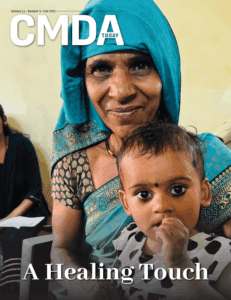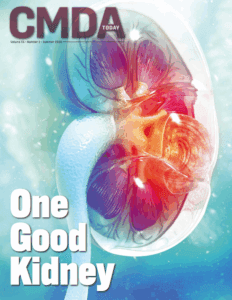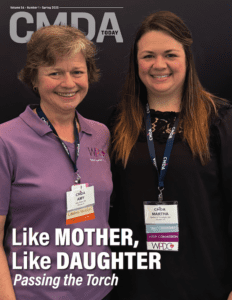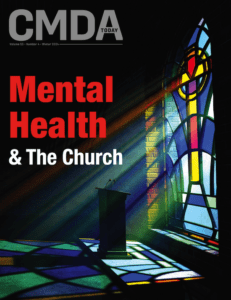Training Medical Students to Care for Patients in Spanish
In the United States there are about 57 million Hispanic individuals, and approximately 40 percent of those have limited English proficiency. Research shows that language-discordance, where the patient and the clinician do not speak the same language, results in reduced access to health information, decreased satisfaction with care and worse health outcomes.
by Tiffany M. Shin, MD
In the United States there are about 57 million Hispanic individuals, and approximately 40 percent of those have limited English proficiency. Research shows that language-discordance, where the patient and the clinician do not speak the same language, results in reduced access to health information, decreased satisfaction with care and worse health outcomes. When Hispanic patients are hospitalized, having limited English proficiency is associated with an increased risk of medical errors and patient harm. On the other hand, when the patient and the clinician speak the same language, health outcomes can be greatly improved. Less obvious is the reality that being able to speak a second language does not necessarily mean a clinician is ready to care for patients in that language. I created the Medical Applied Education in Spanish through Training, Resources and Overlearning (MAESTRO) Program at Wake Forest School of Medicine to teach medical students clinical communication skills in Spanish and the cultural understanding needed to care for Hispanic and Latino patients and to address health inequities.
I joined Wake Forest School of Medicine in 2017 as an assistant professor of pediatrics. As a general pediatrician, I started out teaching pediatrics to medical students and providing bilingual pediatric care to the local Hispanic and Latino community in a hospital-affiliated clinic where more than two-thirds of the patients prefer care in Spanish. It quickly became apparent to me that Wake Forest medical students wanted formal opportunities to learn medical Spanish and gain skills to become bilingual clinicians. Students frequently asked me how I learned to speak Spanish with patients and how they could do the same to improve their care for patients. The difference in communication and rapport with patients and families due to speaking the same language was obvious to them while working in our clinic.
One conversation quickly led to many others, and the idea of creating a medical Spanish program was born. I led a needs assessment at the medical school, where it was clear that Wake Forest medical students had a high level of interest in gaining medical Spanish skills. The medical school leadership was keen to support the creation of a formal medical Spanish program—the MAESTRO Program—as such a program aligned with the school’s goals and priorities.
Improving the Care of Spanish-speaking Patients through Medical Education
The MAESTRO Program’s goal is to train medical students who are equipped with the skills necessary for providing care in Spanish for the growing number of Hispanic and Latino patients in the U.S. The program is designed to integrate clinical communication skills and cultural understanding with language, not teach language alone. The program is designed for medical students with high-intermediate, advanced or native Spanish language proficiency. Often, students enter medical school with Spanish language skills from studying in college or semesters abroad but are unsure of how to develop and maintain their abilities during medical school. In fact, many students report that an important factor in choosing what medical school to attend was looking at the opportunities for medical Spanish education. In the MAESTRO Program, students have the opportunity to build on their language skills to become bilingual clinicians prepared to care for diverse communities and healthcare leaders equipped to address health inequities.
A Unique Four-year Program
The MAESTRO Program is a longitudinal program that runs concurrently with the traditional medical school curriculum at Wake Forest School of Medicine. It follows students’ 18-month preclinical coursework and the subsequent clinical training through the end of their fourth year of medical school. While students are first introduced to new knowledge and clinical skills in their core medical school classes, the MAESTRO Program teaches them how to use and apply these skills with an understanding of cultural aspects in Spanish. During their clinical rotations, students put their training into practice by working directly with Spanish-speaking patients and individualizing their skills with respect to their professional interests and planned medical specialty. The four-year curriculum is key to ensuring that students do not lose language skills during medical school training and that they graduate having advanced their medical Spanish knowledge and abilities.
The program goes beyond mere Spanish vocabulary and incorporates cultural humility and clinical communication training throughout all four years. Students participate in interactive workshops with faculty instructors where they work on medical Spanish skills during group discussions, partner practice and role-play scenarios. Teaching faculty give direct feedback to students during standardized patient encounters where students role-play patient visits with native Spanish-speaking actors. Another important part of the MAESTRO Program is its community service hours requirement, where students use their language skills to interact directly with the local Spanish-speaking community. Most students complete this requirement by volunteering at the medical school’s student-led free clinic, at the hospital’s mobile health clinic or at other community-based free clinics as a Spanish interpreter. Students are provided additional opportunities to further integrate and apply their language skills during clinical rotations and through local and global health clinical electives.
The MAESTRO Program benefits from a unique collaboration with the undergraduate Wake Forest campus Spanish department. Carmen Pérez-Muñoz, PhD, is a Spanish professor who has collaborated on program design and development and who provides essential medical Spanish teaching experience and expertise. Our unique interdisciplinary collaboration has resulted in a learning experience that uses best practices from both language and medicine to present students with a well-rounded education. Students benefit greatly from learning from both Spanish language and clinical experts and tapping into the diverse experiences and knowledge of instructors.
Shaping the Next Generation of Healthcare Professionals
The MAESTRO Program officially launched in 2019, after a successful pilot medical Spanish program in 2018. Our pilot program students are graduating this year, and our first cohort of MAESTRO students will graduate in 2023. Through our program, students gain a community of like-minded individuals who plan to go on to care for Spanish speakers and other underserved communities. They also benefit from close mentoring by peers and faculty from the beginning of medical school through graduation.
Since its onset, the MAESTRO Program has received input from medical students through a student design team. This small team of medical student leaders works with me to ensure the program is learner-centered and effective. The team helps review students’ feedback on the program and provides input on ways to improve the learning experience. This student-faculty collaboration is invaluable and energizing to the process of continual program development. Meanwhile, these students benefit from mentorship and partnership with medical school faculty as they get hands-on learning about medical education, curricular design and leadership.
During clinical rotations, students in our program have demonstrated strong clinical communication and rapport-building skills in general, because they have pushed themselves to develop these skills in two languages. They are quick to ask about social aspects that impact patients’ health, such as food insecurity, transportation issues and other social drivers, as their involvement in our program has deepened their understanding of a holistic approach to the health and well-being of patients. They often help their medical teams navigate cultural issues and advocate for patients and families who do not speak English.
All the students involved with the MAESTRO Program have commented on how their participation has been influential on their formation as healthcare professionals and on their training in medical school. After entering their clinical rotations, students often tell me they did not fully understand how much difference the ability to communicate in Spanish would make interacting with patients. On the wards, they witness first-hand the health inequities faced by patients who do not speak English. The students experience how they can make a difference by listening well, communicating clearly and advocating for patients. Senior students have shared with me that their involvement in the MAESTRO Program is the most common topic they are asked about during residency interviews.
Students have the opportunity to take the Clinician Cultural and Linguistic Assessment (CCLA) for bilingual clinician certification, which allows them to see Spanish-speaking patients without an interpreter. This third-party assessment tool developed by Kaiser Permanente is used by Wake Forest and other healthcare systems for bilingual certification, and students can carry this certification with them through their clinical rotations, on to residency and beyond in their medical careers.
I look forward to seeing our students’ impact multiply as they use their skills in residency and in practice, and I know some will even go on to teach others best practices in caring for patients who do not speak English. It is such a privilege and joy to work with students who are caring and thoughtful and who will be our future generation of healthcare professionals, leaders, advocates and medical educators.
His Ways Are Not Our Ways
I started medical school thinking I would end up as a missionary physician somewhere outside of the United States, but for now, God has placed me on a different path. When I joined the faculty at Wake Forest School of Medicine, I did not plan to start a language program, and I never imagined that God would place me in this capacity to train future healthcare professionals to care for the marginalized and underserved. Beyond that, I had no idea that studying Spanish in high school and college would be so valuable, nor that the experiences I had studying abroad and participating in a medical Spanish program during medical school were preparing me for this role. Even the meetings and conversations with students, faculty collaborators and school leadership were perfectly timed and positioned. Some might call this “luck,” “chance encounters” or attribute credit elsewhere, but without a doubt, God’s amazing hand orchestrated all of this. He guided my steps to land here at Wake Forest to work for His kingdom in this way.
While I am thankful for the difference I can make as a bilingual pediatrician in my practice, I am also astounded by the way that God is multiplying the seeds planted as I teach students the skills I use day-to-day to communicate and connect with patients. Indeed, His ways are not our ways, and His thoughts are not our thoughts (Isaiah 55:9b) May the Lord also guide you as you take each next step in faith to serve Him with your God-given skills and abilities. As you faithfully follow Him, may He continue to show you ways you can care for the suffering, poor or marginalized in your community.
“He has shown you, O mortal, what is good. And what does the LORD require of you? To act justly and to love mercy and to walk humbly with your God” (Micah 6:8).
Bio
Tiffany M. Shin, MD, is a general pediatrician and assistant professor of pediatrics at Wake Forest School of Medicine in Winston-Salem, North Carolina. She graduated from the University of North Carolina School of Medicine in Chapel Hill and completed residency training in pediatrics at the University of North Carolina. During medical school, she trained in a four-year longitudinal medical Spanish program which fueled her passion to care for underserved Spanish-speaking populations. She provides pediatric care to a large, underserved population of children and families who prefer care in Spanish. Her enthusiasm for medical education is evident in her clinical teaching and work in medical Spanish education. She has been recognized for clinical teaching and service and is the founder and director of MAESTRO, the Medical Spanish Certificate Program at Wake Forest School of Medicine.




